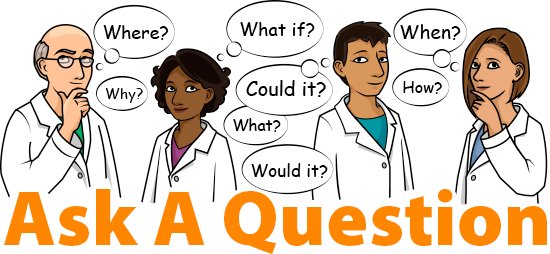Our reaction when curiosity strikes generally makes us ask other people. Most of the time.
Around this time last year, I was undergoing my undergraduate practicum at the Philippine Nuclear Research Institute (PNRI). After completing my required hours, my supervisor had to talk to me to discuss how I fared throughout the duration of the training. He told me that he was pretty much impressed by my performance but ended up telling me that he was torn between liking the fact that I almost never asked him questions or disliking it. The only times I asked him questions were when
- the instructions to me weren't so clear; or
- when I couldn't find answers.
I guess you could say that I am "wired" in such a way that I have to answer my own questions first before turning to other people when I wasn't so sure. I remember asking a friend once about the difference between a curriculum vitae and a resumé (we were asked to make a CV), and I ended up saying, "Oh, never mind. I'll just Google it." Needless to say, the look she gave me was quite unimpressed.
"Then why ask?" she asked.
Why ask?
If I had so much the ability to answer my question first, why do I even have to ask? At the same practicum I was telling earlier, I had a fellow intern (who majored in Mathematics) who just kept asking questions. Literally every half an hour he had a question that I was so sure he could read about in textbooks (and yes, maybe Google). Technology is basically a fountain of wonders that way.
Anyway, I understood that he knew very little about modern physics, with which knowledge of it would be beneficial to our duties as interns in PNRI, but even his own supervisor was growing exasperated and telling him to just turn to us (the other interns) if he had any more questions.
I learned to keep my own questions to myself exactly because of people who ask me back, "If you already know the answer, why ask?" Growing up, I would first ask myself if I could find an answer to my own question. I love reading; thus, I love finding out answers for myself, and sometimes, digging further. On the other hand, I became wary of how I would inconvenience other people by my curiosity.
Before asking "What happened?" I tend to first look around and see if I could even begin to understand what's happening. Asking "Are you OK?" was more to show I care even when I can already see the person isn't OK.
The good thing about asking others.
An article I read said that when you ask questions, you cultivate an open mind. It's really good to be always curious and to question so many things. But isn't merely asking others without even truly trying to find the answer fall a little short to "cultivating an open mind?" You ask to be spoon-fed, not to work your mind. More than asking others, know to ask yourself, too.
I asked myself why the letters in the keyboards are the way they are, and I found answers. And by asking myself and answering that, I also found more questions. What I like to ask others were follow-up questions to my own ones. What if...? Don't you think it will be better if...? How? Why? Questions that are open to many answers, and not limited to one.
The good thing about asking others, though, is that you make them question their knowledge about it, too. How much do they know about this topic? Do they really know anything about it? If a kid asked me something, would I always know the answer?
Why don't we ask questions?
I list down reasons why I [we] hardly ask questions.
The fear of inconveniencing other people.
My friends tell me that I tend to avoid trouble - with other friends, with professors, even with strangers. Because I'll find a way not to inconvenience them, but trouble myself anyway. I don't like asking questions I can find answers to because I feel like I'll be wasting other people's times.
The fear of looking unaware.
Are there good questions? Are there smart questions? Apparently there are, but even the bad ones will still boil down to being questions. You will always be curious. I will always be curious. But sometimes, I couldn't help but think that some questions will make me look dumb or unaware. (It's a pretty petty reason, but I'm socially anxious.)
One time, though, some researchers from different parts of the world came over to school for large-class lectures on their works. One of our professors urged us to ask them questions even when it will make us look stupid; apparently, we have the "license" to look stupid because we are still learning anyway. They wouldn't expect us to ask intelligent questions right away. But no matter how I tried, I couldn't come up with any. I resorted to listening to others' questions, but even theirs were closed-ended ones.
Why not asking questions is not good.
You will not know how to answer a question, or how to carry a good conversation. You limit your answers to yourself, and only know how to satiate your own curiosity. My friends tell me that I have the tendency to close a conversation by simply answering - answering to the point of not making way for more talks. True, it might be just because the question was close-ended, but it might also be because I was answering any follow-up question in my head, that asking them again would look redundant to me.
Is it not good to always ask other people questions?
Too many questions that sometimes border trivial exasperate people. If you want to connect with other people, ask smart questions. Ask smart questions and mean it.
In the end, always asking questions will only be good when you're making way for more questions, more opinions, and more ideas. Googling for answers is good, but only to a point. As Mr. Paul Sloane says, intelligent questions know how to stimulate and provoke, inform and inspire.



